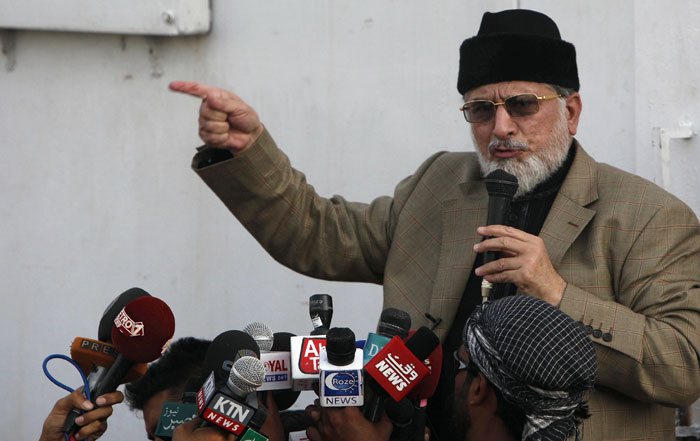Tahir ul-Qadri, Sufi cleric and leader of Pakistan Awami Tehreek, gestures as he addresses members of media outside the parliament house in Islamabad on Wednesday. Thousands of Pakistani protesters tried to blockade parliament on Wednesday.
AFP/Islamabad
Pakistani ministers and opposition politicians met anti-government protesters on Wednesday in a bid to end a week-long political crisis that has rattled the restive nuclear-armed nation.
Thousands of followers of cricketer-turned-politician Imran Khan and populist cleric Tahir-ul-Qadri are demonstrating outside the parliament building, trying to force Prime Minister Nawaz Sharif from office.
Khan and Qadri say last year's general election that swept Sharif to power by a landslide was rigged, and they are demanding his resignation.
The showdown has added to instability in a country that has had three military coups since its creation in 1947 and which is struggling with a homegrown Taliban insurgency, a crippling power crisis and a sluggish economy.
There had been few signs the protest leaders were prepared to back down, but on Wednesday evening a cross-party delegation held an initial meeting with members of Qadri's team to try to resolve the standoff.
Khurram Nawaz Gandapur, a senior leader in Qadri's Pakistan Awami Tehreek (PAT) movement, said they wanted "meaningful talks".
Minister for states and frontier regions Abdul Qadir Baloch, part of the government team, said he was hopeful for a "positive result from the negotiations".
But Khan struck a tougher note, saying he would negotiate only if Sharif resigned.
"We are ready for talks but our first condition is Nawaz Sharif's resignation," he told private TV Channel JAAG.
"There is no use in talks if he does not resign."
The two protest movements are not formally allied and have different goals, beyond toppling the government. But their combined pressure - and numbers - have given extra heft to the protests.
If PAT were to reach a settlement with the government and withdraw, PTI's position would be significantly weakened.
Earlier Qadri repeated his demand for Sharif to quit and install a "national government", though as the delegation arrived for talks at his protest site outside parliament he asked followers to stop shouting anti-government slogans.
The Supreme Court, which has played an influential role in Pakistani politics in recent years, ordered Khan and Qadri to appear on Thursday to explain their protests.
The ruling came after petitions urging the court to restrain Khan and Qadri from "making illegal and unconstitutional demands", Kamran Murtaza, a senior lawyer, said.
The protests have so far been peaceful but the crisis has raised fears that Pakistan's fragile democracy could be under threat of another military intervention.
Rumours have abounded that elements within the influential military have been behind Khan and Qadri's moves, though the cleric and the interior minister have adamantly denied this.
On Tuesday Khan had threatened to break into Sharif's official residence unless he resigned, though Qadri distanced himself from the call, saying his supporters would maintain a peaceful sit-in until the premier stepped down.
Early on Wednesday the army's chief spokesman called for dialogue.
"Situation requires patience, wisdom and sagacity from all stakeholders to resolve prevailing impasse through meaningful dialogue in larger national and public interest," General Asim Bajwa said through a recognised Twitter account.

